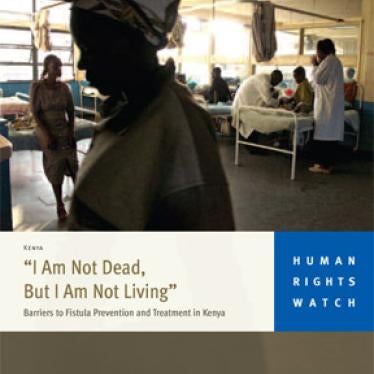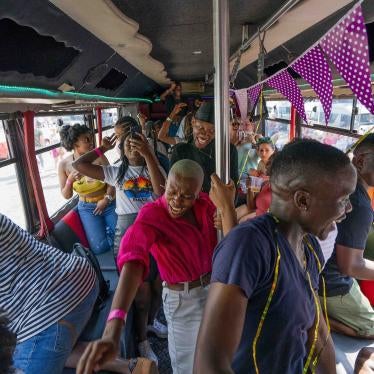Mwendwa P. was 16 when she became pregnant for the first time. When she went into labor, she did not want to go to the hospital near her town in Kenya because, as she told me, "I had heard that nurses abuse girls who get pregnant when they go to deliver."
Mwendwa went through painful labor at home for close to 24 hours before going to the hospital. There, her fears were confirmed: "She [the nurse] told me to open my legs the way I did during sex. I felt so embarrassed because there were other women in the room."
A few years later, when Mwendwa was in labor with her fourth child, she could not face the mistreatment again and decided to deliver at home with a traditional birth attendant. Unfortunately, she had complications. She developed obstetric fistula, which caused her to leak urine and feces constantly for years. Finally she got treatment through a fistula surgery "camp" far from her home.
When I asked Mwendwa why she had not sought treatment for fistula at the provincial hospital close to her home, I learned that Mwendwa had faced poor treatment in health facilities many other times, including once when her child was severely ill. She told me, "I was referred there [to hospital] to take the baby because she had diarrhea and a cough. The child was very ill. Instead they kept me waiting. I had to go back home. They talk very badly. They just toss you from one person to another. They don't even care. I could not go back there."
Mwendwa never lodged a grievance about the bad treatment in health facilities. She told me that she was afraid the nurses would retaliate.
In Kenya, as in many other countries, the health care system lacks the resources to provide care to those who need it, to ensure that there are enough facilities, facilities are well-staffed and stocked, or to ensure that staff are paid, get access to training, or are treated with respect themselves. Even when resources are limited what is available is often mismanaged or misused, and monitoring of how resources are allocated and used or how the health system is performing is inadequate. The poverty of the health care system itself results in a climate in which patient abuse and mistreatment is widespread, but often goes unreported and carries no consequences.
Patients also have few means for exercising their rights. The opportunity for patients to file a formal complaint about health system challenges encountered when seeking care or abusive treatment in health facilities and to get any redress is virtually nonexistent. There are token "suggestion boxes" on walls of many facilities, but health administrators in Kenya told me they're barely used. Kenya makes no effort to enable illiterate patients to lodge complaints. Patients are not systematically informed of their rights, or of how to lodge grievances. Kenyan health authorities are making slow progress toward establishing a grievance policy, but in the meantime, mistreatment by health workers continues without remedy, and the health care system does not get the benefit of formalized feedback from patients.
A dysfunctional grievance system is bad for health care of all kinds. But it is of particular relevance for women and for efforts to eradicate conditions like fistula. Fistula would rarely occur if women had access to family planning information and services to make informed choices about their sexual and reproductive lives and to emergency obstetric care when they needed it. Distance, cost, lack of autonomy, lack of transport, lack of information about potential complications during pregnancy and childbirth, the advantages of facility deliveries, and other barriers stand in the way of many women who need such care. But for others, experience with abusive and poor-quality care, and the lack of means to seek redress for poor treatment in health facilities without facing retaliation keeps them from seeking to deliver their babies in health facilities that offer skilled care. There is a direct relationship: when a woman experiencing obstructed labor delays seeking care due to fear of abusive treatment, the experience can end in fistula.
A functional grievance system is also important for successful fistula treatment. I interviewed women, like Mwendwa, who had waited years or even decades to seek fistula repair surgery, suffering all the while. Some did not know treatment was possible, but others who had heard of repair surgery delayed seeking treatment because the fear of being abused and humiliated by health workers was paralyzing.
Indeed, several fistula survivors I interviewed said nurses rebuked them for" urinating"on their beds and refused to change their bedding, despite the fact that incontinence is the main consequence of the very condition for which they were in the hospital in the first place. Nyakiriro C. told me that hospital staff asked her how an"old woman"like herself could wet the bed, told her to go to another hospital, and said they were"tired" of her. Word gets around quickly when people are treated that way, and worse, when it happens in hospitals. When there's no system to report such mistreatment and get a remedy, both for the person who has been mistreated and for the health care system, it's hardly surprising that so many women suffer for years from repairable fistulas.
Countries like Kenya with high rates of maternal deaths and injuries, including fistula, are saying all sorts of positive things these days about improving maternal health care. However, things are not improving for many and women, particularly the poor, illiterate, and rural, continue to die needlessly during pregnancy and childbirth or to live for years in pain and misery due to injuries like fistula. If they're serious about saving women and their babies, they should listen to patients. Fistula survivors would have a lot to tell them about what stopped them from seeking skilled health care during labor, what problems they encountered in health facilities, or what deterred them from seeking surgical repair. Their insights could make a real difference in improving the health system and helping other women have healthy, safe deliveries and avoid fistulas. An accessible grievance system is vital for getting their feedback, providing remedies, and treating these women with the dignity they deserve.








